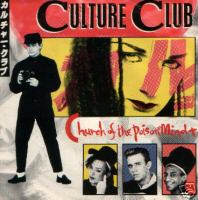| "Church of the Poison Mind" | ||||
|---|---|---|---|---|
 | ||||
| Single by Culture Club | ||||
| from the album Colour by Numbers | ||||
| B-side | Man Shake (7") Mystery Boy (12") | |||
| Released | 1 April 1983 (UK) October 1983 (US) | |||
| Recorded | 1983 | |||
| Genre | ||||
| Length | 3:32 | |||
| Label | Virgin Records Epic Records (US) | |||
| Songwriters | Boy George, Roy Hay, Mikey Craig, Jon Moss | |||
| Producer | Steve Levine | |||
| Culture Club singles chronology | ||||
| ||||
"Church of the Poison Mind" is a 1983 hit single by the British new wave band Culture Club. It was released as the lead single from their second, and most successful, album Colour by Numbers . The song reached #2 in the United Kingdom, being kept out of the top spot by David Bowie's "Let's Dance". [4] It was also the band's fourth Top 10 hit in Canada and the United States. In America, it was still climbing the charts when "Karma Chameleon" was released as a single. Epic Records released "Karma" ahead of schedule. "Church of the Poison Mind" reached its peak position the same week "Karma Chameleon" debuted on the US chart. In many countries its B-side was the heavily percussive street song "Man Shake" and in some others, such as the United States, it was the song "Mystery Boy". Both songs were on the 12-inch single in many countries, except Canada, where it was issued with an extended version of previous hit "I'll Tumble 4 Ya".